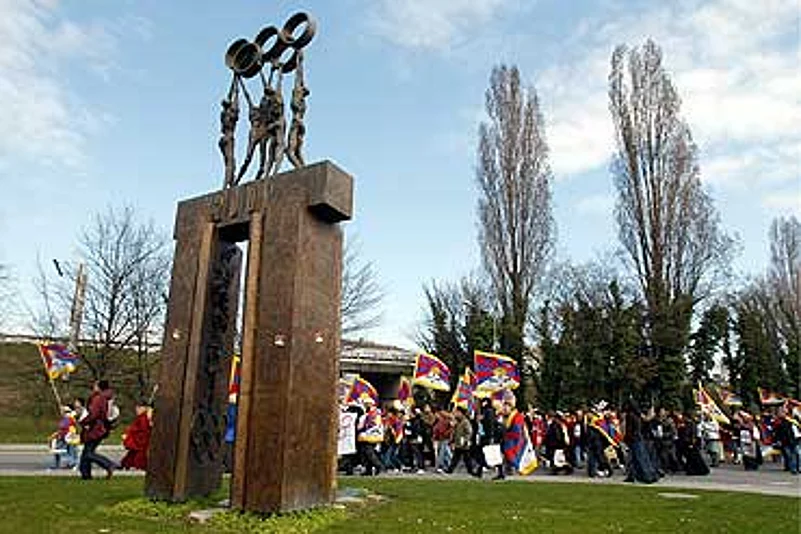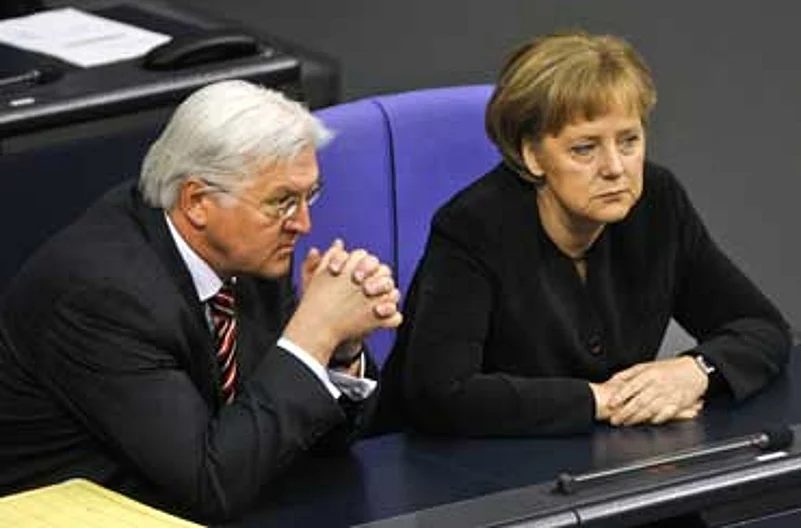European Commission President Jose Manuel Barroso's three-day visit toBeijing, starting April 24, was planned months ago to spotlight European Unionhopes of upgrading political and business ties with China. However, the talkswill now be dominated by EU concern over Beijing's crackdown in Tibet andChinese anger at the bloc's plans to invite the Dalai Lama to a EuropeanParliament session.
Barroso, accompanied by seven top aides including EU trade chief PeterMandelson and monetary affairs Commissioner Joaquin Almunia, must treadcarefully. The EU may be united in urging Beijing to respect Tibetans' humanrights and hold "constructive" discussions with the Dalai Lama, butthe 27-nation bloc is deeply divided on overall policy towards China, includingdemands that government leaders boycott the Olympics opening ceremony in August.
Advertisement
The EU's inability to forge a united stance on dealing with Asia's mostpowerful economy is undermining its reputation elsewhere in the region. Comingclose on the heels of an EU-wide rift on Kosovo, where Europe is split onrecognizing the independence of the former Serb territory, and differences ondeploying troops in the volatile southern regions of Afghanistan, disarray overChina dents the bloc's hopes of becoming a more powerful--and credible--globalactor.
EU divisions over China are not new. Unlike the US which has traditionallyviewed China as a competitor, EU governments have never quite made up theirminds over whether China is a rival or partner. EU officials insist that thebloc's "fundamental approach to China must remain one of engagement andpartnership" but European governments have long struggled to reconciletheir desire for lucrative business deals in China with ongoing public concernover the country's human-rights record.
Advertisement

Protesters walk past a sculpture with the Olympic rings outside the International Olympic Committee (IOC) headquarters in Lausanne, Switzerland
As a result, the EU message on China--and to China--is often confused. Officialsin Brussels, for instance, have a longstanding human-rights dialogue withBeijing and while they also criticize China on the issue, French, German andBritish leaders sweep these concerns aside to clinch multibillion euro contractsin China. Routine resolutions by the European Parliament condemning Chinesepolicies in Tibet, Burma and Darfur go hand in hand with expanding EU-Chinatrade relations and European Commission assertions that China is a"responsible" international actor.
EU trade chief Mandelson in recent months has both berated Beijing as an "outof control juggernaut" on trade and recognized that cheap imports from Chinahave helped keep inflation at bay while China's integration in the Europeanproduction chain has boosted EU competitiveness.
Recent events in Tibet risk making the already-difficult EU balancing act eventrickier. For one, EU divisions over the Olympics will be embarrassingly visibleif some European leaders stay away from the Games while others attend. Second,the EU mood on China is souring overall, with many Europeans frustrated atBeijing's focus on opening of high-level strategic economic dialogue with the USand, in contrast, its failure to respond to EU calls for more trade restraintand changes in monetary policy.
Certainly, European public opinion is turning distinctly anti-China. The Olympictorch relay through Europe in early April sparked protests in Olympia, Londonand Paris, with protesters condemning China's occupation of Tibet, oppressivemedia censorship, the jailing of dissidents and human rights activists, Darfurand other causes.
The European Parliament has called on EU leaders to boycott the inauguralceremonies. Former student revolutionary Daniel Cohn-Bendit, leader of theparliament's Green group, compared the Beijing Games with those hosted by NaziGermany in 1936.
In addition, European Parliament President Hans-Gert Poettering, a close ally ofGerman Chancellor Angela Merkel, has invited the Dalai Lama to address theassembly while French Foreign Minister Bernard Kouchner has suggested theTibetan spiritual leader should attend a meeting of EU foreign ministers. Nodates have been set for either of these encounters, but China has reactedangrily, accusing the EU of meddling in its internal affairs.
Several European politicians plan not to attend the Olympics opening ceremony.Leaders from former communist Eastern Europe, who generally take a tough line onChina--and Russia--are spearheading the drive to avoid the August 8 festivities.Polish Prime Minister Donald Tusk and Czech President Vaclav Klaus have saidthey will not attend the Olympics.

German Chancellor Angela Merkel, right, and Foreign Minister and Vice-Chancellor Frank-Walter Steinmeier
Significantly, Germany's Merkel and Foreign Minister Frank-Walter Steinmeierhave declined to take part in the opening ceremonies while French PresidentNicolas Sarkozy has not made up his mind yet. Britain's Gordon Brown will onlyattend the closing ceremonies and fulfill ceremonial duties, given that Londonwill host the 2012 Summer Olympics.
Germany's stance on China is especially confused. The EU's largest economyrelies heavily on exports to China--worth 27.5 billion euros last year--butmembers of the ruling grand coalition of Social Democrats and ChristianDemocrats are at odds over how to deal with Beijing. Merkel has taken a tougherline on Beijing than her social democratic predecessor Gerhard Schroeder. Herdecision to meet the Dalai Lama in her office last September cast a chill inGerman-China relations. Aides say the chancellor has not spoken with PrimeMinister Wen Jiabao in several months.
Germany's social democrat Foreign Minister Frank-Walter Steinmeier, however, istrying hard to mend fences with Bejing and has held two meetings with Chinesecounterpart Yang Jiechi, making it clear he opposes a boycott of the Games.German business leaders press for a thaw in Berlin-Beijing ties, but Berlin alsorecently suspended talks with China on climate change and renewable energybecause of events in Tibet. As such, rebuilding trust between the two countrieswill not be easy.
While Germany blows hot and cold on China, the voice of pro–free trade EUstates like Britain and the Netherlands is drowned out by southern Europeannations, including Italy, which worry about rising trade competition from China,and eastern EU newcomers, which add their weight to Nordic concerns over humanrights.
EU officials complain that China’s lukewarm response so far to key EU demands,including Mandelson's repeated warnings that the rapid rise in China's tradesurplus with the EU--which grew by 21 percent last year to reach a record 159.2billion euros, or US$251 billion--is not making their task of fightingprotectionism any easier.
China must provide the EU with "a good news story" on trade and humanrights, they say, to prove that engagement and constructive dialogue are worththe effort. As such, Brussels is hoping to launch a so-called "high-levelmechanism" on trade at the meeting in Beijing to discuss issues likeimproved protection of intellectual property rights and product safetystandards.
EU Monetary Affairs Commissioner Almunia, meanwhile, wants Beijing to stopfocusing on the yuan’s exchange rate with the dollar and also allow itscurrency to appreciate faster against an ever-stronger euro. In addition, the EUhas complained about China's neglect of governance standards in pursuit ofenergy resources in Africa while several EU governments, heeding US warningsabout the rise in China's military budget, have indefinitely shelved plans tolift an EU arms embargo against Beijing.
European governments' inability to speak with one voice on China diminishes theEU's clout. The EU says it demands that Beijing talk to the Dalai Lama areprompted by real concern that discontent in Tibet could spread to otherprovinces and a longstanding European belief that a more open society, withbetter protection of human rights and the rights of minorities, is in China'sinterest. But China is unlikely to pay heed to advice, however wise andwell-intentioned, delivered by a divided and weak Europe.
Advertisement
Shada Islam is a senior program executive at the European Policy Centre.She writes for YaleGlobal Online in a personal capacity. Rights: © 2008 YaleCenter for the Study of Globalization.YaleGlobal Online



















